
Related
Guests
- Ken Squierowner of WDEV, an 80-year-old family-owned independent music, news and sports station that serves roughly the northern third of Vermont. WDEV was founded by his father Lloyd in 1931.
As Hurricane Irene bore down on Vermont on Sunday, the national media missed the story. Across the state, rivers rose to record levels, washing away 200-year-old covered bridges, communications and roads. Residents across the state lost internet. Radio Vermont WDEV broadcasters Ken Squier, Eric Michaels, Lee Kittell, Tom Beardsley and the station meteorologist Roger Hill stayed on the air for 24 straight hours, providing a link to stranded citizens and communities. Running on generators and with no internet, WDEV became the lifeline between communities that were cut off on all sides, as citizens provided one another with news, information and reassurance. As Vermont and northern New York were submerged, national media pronounced the storm over, and a dud. We speak with Ken Squier, owner of WDEV, an 80-year-old family-owned independent music, news and sports station that serves northern Vermont. Squier has been a fierce critic of media consolidation and advocate for independent media — albeit commercial media. [includes rush transcript]
Transcript
AMY GOODMAN: As Hurricane Irene bore down on Vermont Sunday, the national media missed the story. All eyes were on New York City. As rivers rose to record levels, washing away 200-year-old covered bridges in Vermont, communications, roads and internet around the state broke down.
WDEV broadcasters Ken Squier, Eric Michaels, Lee Kittell, Tom Beardsley and the station meteorologist Roger Hill stayed on the air 24 hours—it normally goes off the air from midnight to 5:00 a.m.—providing a link to stranded citizens and communities. Running on generators and with no internet, WDEV became the link between communities that were cut off on all sides, as citizens provided one another with news, information, reassurance. As Vermont and northern New York submerged, national media pronounced the storm over and a dud.
Ken Squier is owner of WDEV, an 80-year-old family-owned, independent music, news and sports station that serves roughly the northern third of Vermont. WDEV was founded by his father in 1931. Squier is in the Motorsports Hall of Fame, among others, for his work for CBS Sports bringing NASCAR to TV. Ken Squier has been a fierce critic of media consolidation, an advocate for independent media, albeit commercial media. Ken Squier joins us now from Waterbury, Vermont.
Welcome to Democracy Now!, Ken.
KEN SQUIER: Thank you, Amy.
AMY GOODMAN: It’s good to have you with us. Well, talk about what has happened in Vermont. I mean, you have been a real nerve center, even for the Vermont government, in understanding what was taking place, the devastation that isolated so many communities from each other as bridges and roads were washed away.
KEN SQUIER: Well, Bill McKibben was quoted today on this business of what’s changed so much that has affected Vermont. And water vapor, he says, is four percent warmer than it was a generation ago, and it loads the dice, rather, as he put it, for drought or deluge. And we got the deluge big time up here. It was a surprise, because it was something that we’ve never seen heretofore.
AMY GOODMAN: And talk about what you did at WDEV. And Democracy Now! broadcasts every afternoon on WDEV. But during the flood on Sunday, what happened to DEV?
KEN SQUIER: Well, what we believe needs to happen on all the radio stations in the United States. And that is that you’re there as the license was originally granted—that’s not quite the same as it is today—from the Federal Communications Commission, but really there for the public good, need and necessity. And this was one of those instances. And like your program, that team you mentioned at the commencement of this, they believe in it as much as I do, and therefore, we were able to take people out of the sales department—and most important, the people of a Vermont spoke up. They were the reporters. And they did a whale of a job.
AMY GOODMAN: You have the only meteorologist on local radio? You have your own meteorologist on WDEV?
KEN SQUIER: Yeah, sort of. Yeah, he moonlights with a lot of people. But he’s very, very good. And he put his finger on why we got the surprise. This was sort of a double whammy. One, we got that sloppy old hurricane. And then, two, we got an authentic flood, because this kept cycling over our state and just dumping more rain on us. And he pointed out that five inches of rain in flat country is five inches of rain. But in these narrow valleys in which we live and love in Vermont, that becomes 20 inches. And when it gets loose on those small creeks, it starts down through and becomes larger brooks, and then it gets into our rivers, like the Winooski, to which we’re adjacent, and then on into Lake Champlain. That’s where the trouble comes. And that’s exactly why this community of Waterbury, Vermont, was hit—not as seriously as in 1927, when you could take a rowboat off the top the Main Street and take people out of their second-floor windows, but it was a wake-up call that things are changing and that we need to change things in Vermont to prepare for more of these kind of deluges.
AMY GOODMAN: So, you mention 1927. This is being compared, the devastation, to the Great Flood of '27, also 1938, the second devastation, the Great Hurricane. Your radio station—next month you're celebrating 80 years as an independent radio network in Vermont—was on the air at that point, in the midst of the Great Hurricane, is that right, Ken? Owned by your father at the time, Lloyd?
KEN SQUIER: Well, we were on briefly. We had a brand new tower, 439 feet tall, and we were damn proud of it. And it had been in business for two months, replacing the older tower, which was a wooden tower, actually, with a copper wire off it. And it came down in a hurry in that flood—in that hurricane of 1938, which did considerable damage. But the flood of 1927 was far different, far different. That one strangled the state for a considerable amount of time. And it’s the months after, like it is now, and the recovery is what is critical. So, 1938 was a whale of a wind. It knocked down a lot of maple sugar orchards, and it knocked down our tower.
But the business of working in the public good, need and necessity goes back to that time. And I don’t think there’s a chance that radio, as we know it, stands a chance of existing, unless they begin to take up this business of serving their communities. There’s a payback on that, as you know, Amy, when you serve the community and truly serve them. And one of the problems is that Congress let radio off the hook. The lobbyists got in there. Here I go, ranting. But the lobbyists got into the business, and they changed the rules. And so, public good, need and necessity is kind of a lip service thing. But the reality is, for radio broadcasting, younger people today don’t need radio for music. They can get their music many, many new ways. And what we can still be, as you are, is a conduit to what is important, relevant, and in the local communities, that’s where radio can do such a methodist job.
AMY GOODMAN: Now, I assume you’ve been getting offers of your station being bought, at least every week, from the major megacorporations—
KEN SQUIER: Yes.
AMY GOODMAN: —but you choose to remain independent. Talk, when you talk about public service, how media consolidation affected the coverage of this hurricane, which by the time it hit Vermont was actually a tropical storm, though it has wreaked terrible devastation on your state.
KEN SQUIER: Well, actually, “terrible,” you’ve got to define that pretty carefully, Amy, because what I see is Vermont resiliency. You know, if you live up here and you get used to those three- and five-foot drifts in the winter, when we get those blizzards, people get along, and they work together. And that’s part of what local radio, if it’s properly done, in our minds, can make the difference. It brings the people together as a community. And I’m now ducking away from your question. Do it again. I’m sorry.
AMY GOODMAN: Well, just asking about how you feel media consolidation affected the ability for people to communicate in Vermont.
KEN SQUIER: I can’t tell you, because I haven’t listened to anybody else. But I can assure you that those systems—and it’s the old Minot, Dakota, story, where you couldn’t find a radio station with a human voice in it. It was all this canned material from outside. I’m sure that that was prevalent. So—
AMY GOODMAN: And that was at the time of a terrible train derailment—
KEN SQUIER: That’s exactly right.
AMY GOODMAN: —that led to an ammonia spill that made so many sick, but they could get no warning out because the stations were being programmed from outside the state of North Dakota.
KEN SQUIER: Indeed, yeah. Well, I’m sure that that went on, but one of the reasons that this radio station is 80 years old and still—kind of, I’m sure, seen as a fuddy duddy and a little grey—exists, because we are a reference, we are a place people can go to and feel assured that, whether it’s town meeting day or these days, these exceptional days that we’re going through right now, that they have a voice. And really, it’s the same old business about how radio needs to work, which is, let the people really be a part of it. And you can do that on a commercial radio station and exist. You won’t make quite the profit of the—of those milking machines that just pour out the music and treat it like milk. It is more than that. And it becomes something that is of consequence in the community. Radio needs to be of consequence. And I’m lecturing to the choir here, aren’t I?
AMY GOODMAN: Well, you’re used to it on WDEV, also well known for your show Saturday mornings, Music to Go to the Dump By. But when you had the government of Vermont, their emergency communications system, also in Waterbury, washed out, yet there was WDEV continuing on with generators, talking about, you know, who—what communities were isolated. If you can give us some of the examples, and also the importance of the bridges—we’re talking centuries-old bridges, covered bridges. Scores of bridges, overall, have been wiped out at this point. And you mentioned, Ken, how this has to be instructive of where Vermont needs to go today, how it needs to be prepared. If you could talk about what you see needs to be done?
KEN SQUIER: Well, Roger Hill made an interesting point that we really do need to rethink. Our shunpikes and turnpikes are pretty tough, I mean, to get through the kind of weather we get on an annual basis. But maybe it’s time to rethink the size of culverts that we use, because where the water dams up in the first place are in culverts. And perhaps we need to rethink that, because they wash around them, wash about them, and the next thing, you’ve got a 10-foot hole in the road that counts to get to the community center. I thought that was an interesting point that he made in some of the broadcasts.
We’re a tourist state. We’re still proud of our agriculture, but we know what business we’re in. And we’re in the business of people getting away from metropolitan areas and enjoying beautiful countryside. My dad used to say there were two reasons to live in Vermont. One was September, and the other, October, because the leaf lookers all came, and still do. So when we lose those covered bridges, we’re losing more than heritage and tradition. We’re losing one of the tickets that we have to attract people to this state and find out that we have a great symphony orchestra, that we have wonderful chamber orchestras, that we have people that care about people coming up here. And that’s tragic, because that is the future for us. We are the beckoning country. And losing that part of that heritage, that people are searching for in the United States, I think it’s vital that we consider what is happening to us now.
Actually, Amy, we had two things happen to us. We had a sloppy old hurricane come up through here, and out of that has come this flood. So it’s 1938 along with 1927. And that’s what’s—that’s what set us back a pace or two. But to watch the resiliency of these communities dealing with these problems and getting out the word today of how far we’ve come since yesterday, that’s typical Vermont.
AMY GOODMAN: Now, Ken Squier, I know you cover elections, like everyone else—or, maybe not like everyone else. But we’re moving into a presidential election year, and I wanted to end with the quote of Republican presidential candidate Michele Bachmann, who made comments over the weekend regarding the destruction caused by Hurricane Irene. She described both the hurricane and last week’s earthquake in the eastern United States as a warning from God.
KEN SQUIER: Yes, yeah.
REP. MICHELE BACHMANN: And I don’t know how much God has to do to get the attention of the politicians. We’ve had an earthquake. We’ve had a hurricane. He said, “Are you going to start listening to me here?” Listen to the American people, because the American people are roaring right now, because they know what needs to be done. They know the government is on a morbid obesity diet. It’s got to rein in the spending. This is not a difficult problem to solve.
AMY GOODMAN: That was presidential candidate Michele Bachmann. Ken Squier, your concluding comments?
KEN SQUIER: Well, I’m pleased to hear that it’s not a difficult problem. Gosh, it seems like we could deal like Vermont and get through it in a couple of days and be back on the right track, but I don’t think that’s quite the way it is. It’s certainly—I’ll tell you what I wish God would come down and say: “term limits.”
AMY GOODMAN: Ken Squier, I want to thank you very much for being with us, owner of radio station WDEV in Vermont, which stayed on through the storm at the time when the emergency center for communications for the government went down in Waterbury. They moved to Burlington. He stayed on the air 24 hours. He’s president of the Radio Vermont Group, NASCAR legend in the Motorsports Hall of Fame. Thanks so much for being with us.

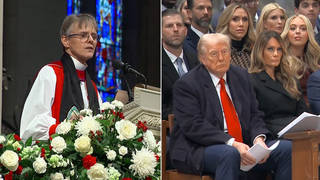
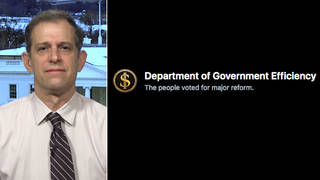
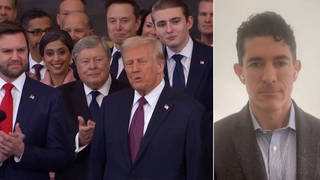
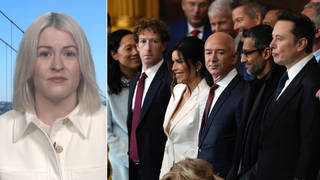





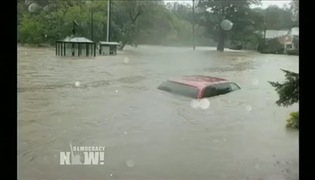
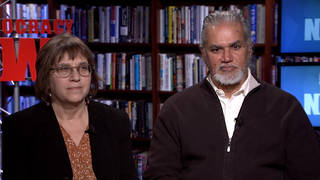
Media Options